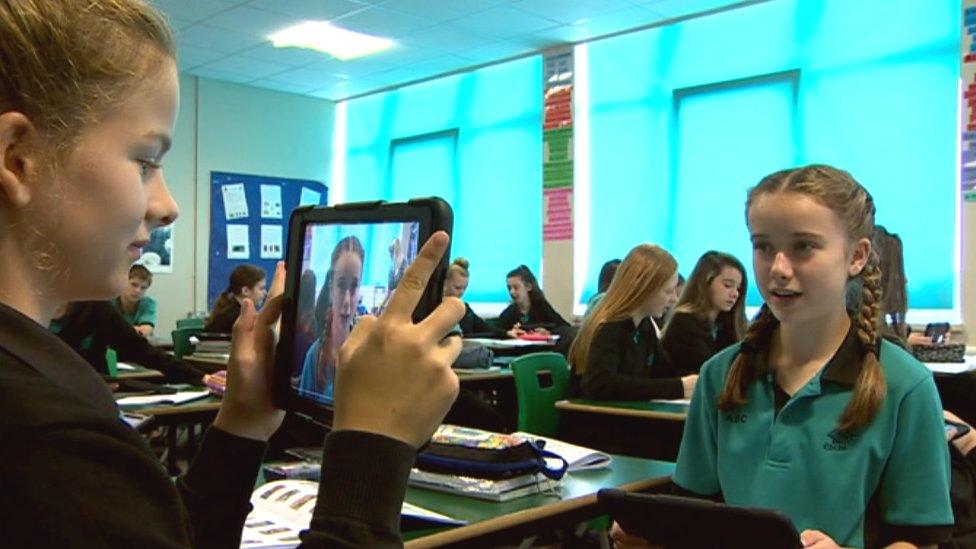Pupils 'more employable' learning digital skills in schools
- Published

Pupils at Cardiff's Ysgol Gyfun Bro Edern use iPads in lessons
Students need to learn digital skills in school to help them be more employable in the future, the education secretary has said.
Kirsty Williams launched the Digital Competence Framework (DCF) on Wednesday in order for pupils to be able to use technology effectively.
The scheme, which includes learning on iPads, has been fast-tracked.
But she stopped short of saying the Welsh Government had been slow in rolling out such a programme.
While the turnaround since being given the go-ahead last year has been quick, experts warned in 2014 schools were in danger of being left behind over digital education.
DCF is available now to all schools but it will not be compulsory until 2021, which by then will come seven years after the warning.
By 2021, it will also be seven years since England introduced a new national curriculum for computing, although that is focused on learning how to code.
"We are dealing with a curriculum that was designed before the fall of the Berlin Wall, before everybody had mobile phones and before tablets had even been invented," said Ms Williams.
Pupils Lauren and Amelia are learning digital skills at Cardiff's Ysgol Gyfun Bro Edern
"We've recognised that we need to change our curriculum and this area was the area we identified which could make the biggest difference most quickly and that why we have acted and we've done so with pace."
The framework is designed to map out the use of technology for children from nursery age through to 16.
It is also said to be "future-proof" as pupils will be able to apply their skills to technology which at the moment does not exist.
Ms Williams said digital skills would "sit alongside" numeracy and literacy in lessons so they will be able to read, do maths and use technology in all aspects of their learning.
The framework - which has 13 are "pioneer schools" who helped develop it - is available to all schools to take on now but it will become compulsory in 2021 when the new Wales curriculum is fully rolled out.
But Ms Williams denied a suggestion from an OECD global study which warned classroom technology could be a distraction.
"The OECD said in their report there are limitations in what technology can deliver within a classroom but what the OECD also recognises is the important skills that people need to enter into the world of work," she said.
Kirsty Williams stopped short of saying the Welsh Government had been slow
"We're not throwing out the traditional methods, we're using digital technology to complement what we already do in Welsh schools.
"Crucially, this is about being able to give young people the skills that employers will look at and will be looking for when students leave education."
The Welsh Conservatives questioned whether the plans could work given a lack of access to broadband in many parts of Wales.
Education spokesman Darren Millar said: "When the Cabinet Secretary states that the framework has been designed for 'all children in Wales', she forgets that many parts of the country lack access to even the most basic internet speeds.
"I will therefore be seeking assurances from the Labour-led Welsh Government as to how they will ensure that children, for example, living in rural Wales are not at a disadvantage because of their failure to banish broadband not-spots."
- Published15 September 2015

- Published10 June 2015

- Published1 September 2014